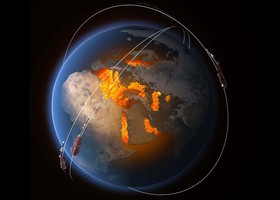Japanese Ryugu probe begins to return journey
Fewed by - Muzammil Zafar
Japanese space probe Hayabusa 2 just completed a mission on the asteroid Ryugu, which scientists believe may contain organic matter, and would, therefore, provide clues about the origin of life on Earth. The asteroid is currently 250 million km away from Earth, from which the probe succeeded in collecting sub-surface samples. If the capsule manages to return safely back to Earth, these will be the first sub-surface asteroid samples ever collected.
space
asteroid
earth
japan
probe
hayabusa
ryugu
origin
life
Mon Nov 18 -
Reuters

